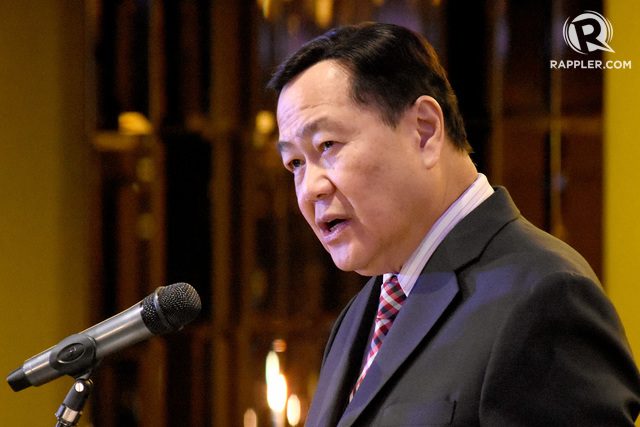SUMMARY
This is AI generated summarization, which may have errors. For context, always refer to the full article.

MANILA, Philippines – Retired Supreme Court senior associate justice Antonio Carpio disagreed with Vice President Leni Robredo’s demand that the Philippine government must require China to recognize Philippine ownership and sovereign rights over the West Philippine Sea before pursuing a contract for oil and gas exploration.
Carpio took this position as he explained that because the oil and gas exploration deal between Manila and Beijing would be done through service contracts, the joint exploration is safe as service contracts expressly recognize that the area falls within Philippine sovereignty or sovereign rights. (READ: Carpio, Del Rosario say PH ‘safe’ with China oil deal)
“We don’t have to state, we don’t have to require that China expressly recognize that we have sovereign rights. It’s by the mere fact that they come in through a service contract, the necessary consequence is that they recognize that the resources there, the oil and gas, belong to the Filipino people,” Carpio told reporters Tuesday night, October 29.
Carpio cited as an example the existing service contract in Recto Bank (Reed Bank) in the West Philippine Sea in which the service contractor is Forum Energy. Businessman Manuel V Pangilinan’s PXP Energy Corporation, through its London-listed unit Forum Energy Plc, holds an exploration permit covering Recto Bank.
“The Chinese will come in through a service contractor, that means in Reed Bank they will partner, or they will have a cooperation with Forum Energy and under the service contract between Fourm Energy and the Philippines, there is an acknowledgment by Forum Energy that the Philippines has sovereign rights over Reed Bank, that the Philippines owns the natural gas there,” he said. (READ: Carpio on West Philippine Sea: Every Filipino’s duty to defend PH territory)
Robredo earlier said she did not believe the oil and gas deal between the Philippines and China would be “fair” to the Philippines and said the country should not enter into joint exploration agreements concerning areas covered by the 2016 Hague ruling. The landmark Hague ruling struck down China’s 9-dash line in the South China Sea and upheld the Philippines’ rights over the West Philippine Sea.
“Kasi may pinag-awayan eh, may pinag-awayan (We fought over this area, we had a dispute over it). We filed a case against China,” said Robredo.
Face-saving solution
Carpio earlier pointed out that China’s participation in oil and gas exploration through a service contract would suffice. Together with the 2016 Hague ruling, the retired justice said a service contract would be “sufficient” to preserve and protect the Philippines’ exclusive sovereign rights in the West Philippine Sea.
This is because there would be “implied admission” by China that oil and gas in areas covered by the memorandum of understanding (MOU), and the terms of reference (TOR) implementing it, belong to the Philippines.
“We cannot expect China to admit expressly in writing that the Philippines has exclusive sovereign rights in the West Philippine Sea. The Chinese government will have to justify the MOU and TOR with the Chinese people, and we must help the Chinese government find a face-saving solution,” Carpio said at forum on the South China Sea code on Monday, October 28.
However, Carpio, a staunch defender of the West Philippine Sea, likewise warned the Philippines must be “firm” that any cooperation on oil and gas in the West Philippine Sea followed terms under the MOU and TOR.
“There should be no deviation whatsoever from the MOU and TOR,” he said.
Carpio has stated in the past that once finalized, the MOU and TOR may be the “solution” to the South China Sea dispute.
“If so, we would have found the formula, under the Duterte administration, for a South China Sea-wide peaceful settlement of what is considered as the most intractable maritime dispute in the world today,” Carpio said. – Rappler.com
Add a comment
How does this make you feel?
There are no comments yet. Add your comment to start the conversation.